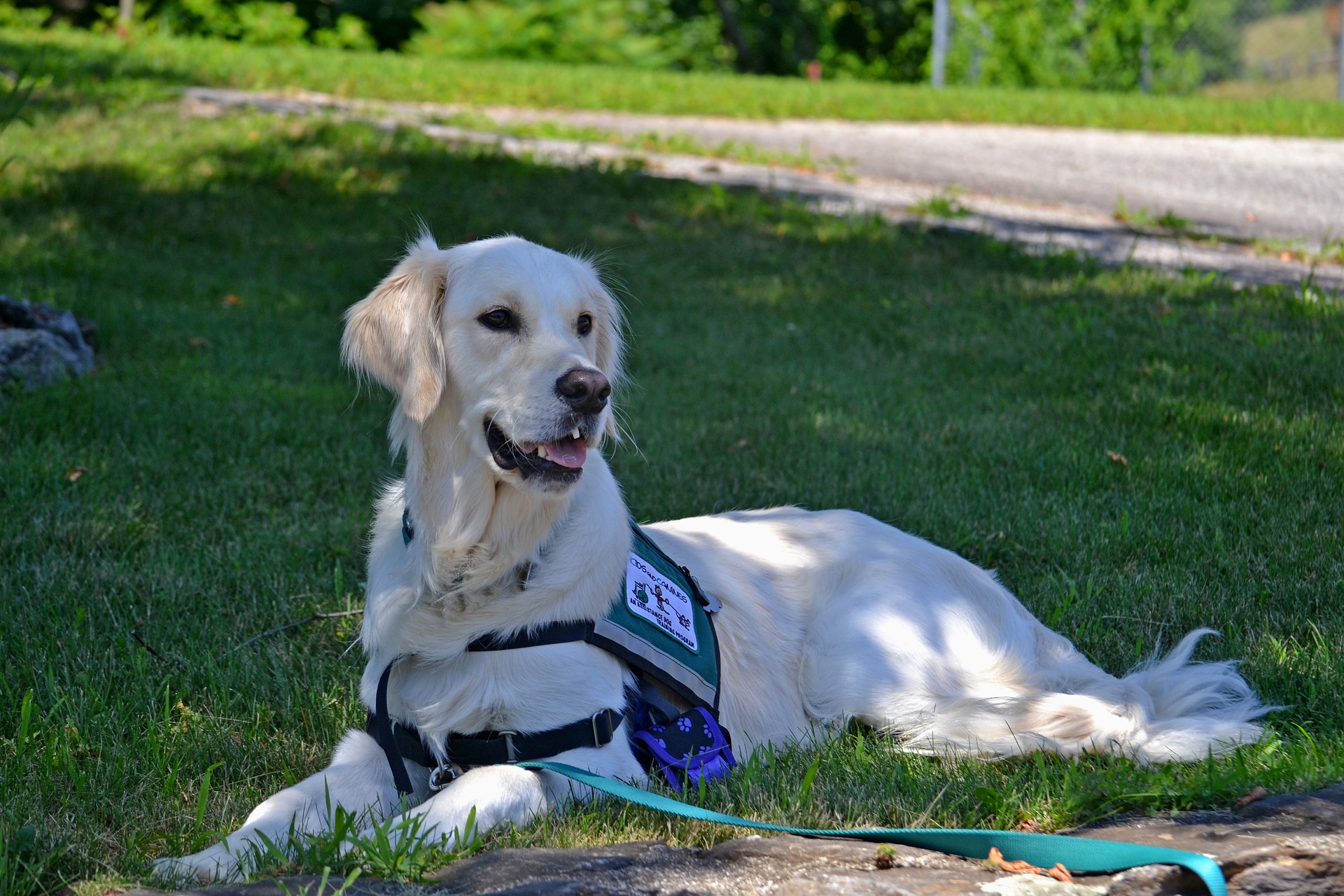
Advocacy, Resources  Buddy (photo courtesy of Tricia Booker)[/caption]
The same goes for our children. Having a trained dog who can assist a child with physical and/or psychological needs can dramatically improve quality of life for the entire family. A large dog can help a small, frail child with mobility. An autism assistance dog can stay with a child who runs away, making sure he doesn’t get lost. A psychiatric service dog, like my friend’s, can help alleviate debilitating anxiety and usher a child through a stressful school day.
We acquired our service dog, Buddy, for my son. Nico was just seven and had not yet been diagnosed. I just knew that something was wrong, and I had noticed his strong connection to our pet Labrador retriever. After being properly trained, Buddy did indeed help reorient my son when Nico’s mysterious mind began heading off to parts unknown.
Sometimes the two of them cuddled under the table at restaurants when Nico became overwhelmed by noise. Other times, Buddy gave him courage when facing new situations or stepping out of his comfort zones. This dog became a critical part of our treatment plan for our son.
But that doesn’t mean everyone thought it was okay. I’ve been questioned endlessly about Buddy. While I am long past the point of stuttering over why I get to bring my dog into the grocery store, I still, like my friend, become rattled on occasion.
Buddy (photo courtesy of Tricia Booker)[/caption]
The same goes for our children. Having a trained dog who can assist a child with physical and/or psychological needs can dramatically improve quality of life for the entire family. A large dog can help a small, frail child with mobility. An autism assistance dog can stay with a child who runs away, making sure he doesn’t get lost. A psychiatric service dog, like my friend’s, can help alleviate debilitating anxiety and usher a child through a stressful school day.
We acquired our service dog, Buddy, for my son. Nico was just seven and had not yet been diagnosed. I just knew that something was wrong, and I had noticed his strong connection to our pet Labrador retriever. After being properly trained, Buddy did indeed help reorient my son when Nico’s mysterious mind began heading off to parts unknown.
Sometimes the two of them cuddled under the table at restaurants when Nico became overwhelmed by noise. Other times, Buddy gave him courage when facing new situations or stepping out of his comfort zones. This dog became a critical part of our treatment plan for our son.
But that doesn’t mean everyone thought it was okay. I’ve been questioned endlessly about Buddy. While I am long past the point of stuttering over why I get to bring my dog into the grocery store, I still, like my friend, become rattled on occasion.
Service Dogs Play an Important Role, Whether Society Is Ready for Them or Not
My friend Kay has a psychiatric service dog to help combat anxiety and depression. The dog—a beautiful, well-behaved golden retriever who goes everywhere with her—is trained to help her when she encounters stressful situations. The dog is an important part of maintaining her mental health. Recently, Kay went to a routine doctor’s appointment, and her dog went along. Now, my friend is generally strong and resilient. But the doctor’s office freaks her out a little. She has flashbacks and fears, and she panics, which means it’s imperative that her dog go with her. On this occasion, one of the office doctors approached her and asked why she had a service dog and whether she really needed the dog, since doctor’s office staff tried to maintain a sterile environment. I’ll pause here, just for a moment, so you can laugh out loud and try to remember being in a doctor’s office that seemed sterile. My friend, a warrior woman who says what she thinks and fights for her rights, was rattled. She didn’t start crying until she was safely back in her car. She’s used to being questioned about her service dog. What she didn’t expect was to be challenged about the dog in the very place that should understand her need for one.More and more of us are being prescribed treatments that come with wagging tails and liver treats.
[caption id="attachment_25960" align="alignright" width="297"] Buddy (photo courtesy of Tricia Booker)[/caption]
The same goes for our children. Having a trained dog who can assist a child with physical and/or psychological needs can dramatically improve quality of life for the entire family. A large dog can help a small, frail child with mobility. An autism assistance dog can stay with a child who runs away, making sure he doesn’t get lost. A psychiatric service dog, like my friend’s, can help alleviate debilitating anxiety and usher a child through a stressful school day.
We acquired our service dog, Buddy, for my son. Nico was just seven and had not yet been diagnosed. I just knew that something was wrong, and I had noticed his strong connection to our pet Labrador retriever. After being properly trained, Buddy did indeed help reorient my son when Nico’s mysterious mind began heading off to parts unknown.
Sometimes the two of them cuddled under the table at restaurants when Nico became overwhelmed by noise. Other times, Buddy gave him courage when facing new situations or stepping out of his comfort zones. This dog became a critical part of our treatment plan for our son.
But that doesn’t mean everyone thought it was okay. I’ve been questioned endlessly about Buddy. While I am long past the point of stuttering over why I get to bring my dog into the grocery store, I still, like my friend, become rattled on occasion.
Buddy (photo courtesy of Tricia Booker)[/caption]
The same goes for our children. Having a trained dog who can assist a child with physical and/or psychological needs can dramatically improve quality of life for the entire family. A large dog can help a small, frail child with mobility. An autism assistance dog can stay with a child who runs away, making sure he doesn’t get lost. A psychiatric service dog, like my friend’s, can help alleviate debilitating anxiety and usher a child through a stressful school day.
We acquired our service dog, Buddy, for my son. Nico was just seven and had not yet been diagnosed. I just knew that something was wrong, and I had noticed his strong connection to our pet Labrador retriever. After being properly trained, Buddy did indeed help reorient my son when Nico’s mysterious mind began heading off to parts unknown.
Sometimes the two of them cuddled under the table at restaurants when Nico became overwhelmed by noise. Other times, Buddy gave him courage when facing new situations or stepping out of his comfort zones. This dog became a critical part of our treatment plan for our son.
But that doesn’t mean everyone thought it was okay. I’ve been questioned endlessly about Buddy. While I am long past the point of stuttering over why I get to bring my dog into the grocery store, I still, like my friend, become rattled on occasion.
Why do we get to bring our dog everywhere? Are we so special?
Well, yes! We all have different reasons for why our children use animals to be their best selves. We don’t need to share those reasons if we don’t want to. Nor do we have to justify our use of service dogs. But we do need to be aware of our rights and be prepared for strangers who question those rights. Some points to consider:• A service dog is a canine that is individually trained to do work or perform tasks for the benefit of an individual with a disability, including a physical, sensory, psychiatric, intellectual, or other mental disability. Federal law permits these dogs to go anywhere the general public is allowed to go. • An emotional support animal offers comfort and calm to help with fear and anxiety, but is not regulated by federal law. Different states have different standards for where these dogs are allowed. • Business owners have the right to ask a handler two questions:Years from now, I think, the use of dogs as medical treatment will have become almost commonplace. So many of our animals, filled with love for their people and a willingness to learn, can provide assistance that’s far less invasive than traditional meds and far more comforting, as well. While that day may be far off, the ability to use such therapy exists right now, regardless of whether society is ready for it.The handler is not required to provide any sort of documentation or certification. (Airports are the exception to this rule.) • Businesses DO have the right to ask a handler and service dog to leave if the animal’s behavior causes disruptions or dangers to others. • Handlers are responsible for cleaning up and caring for their animals. This includes providing food and water and disposing of animal waste.
- Is this animal required because of a disability?
- What work or task has the animal been trained to perform?



